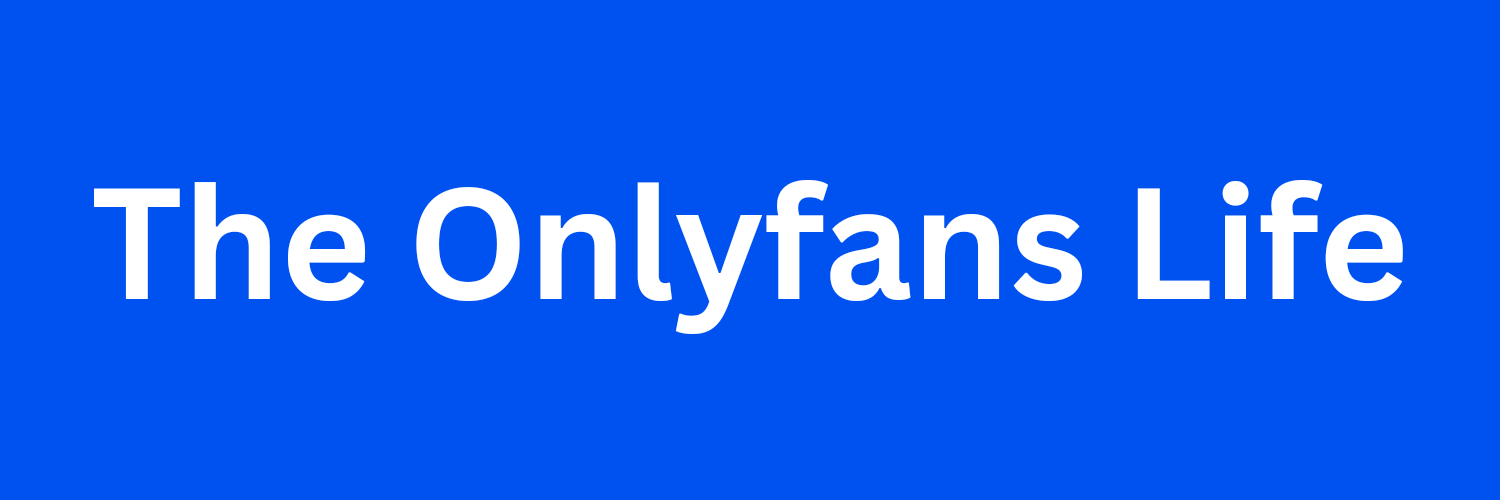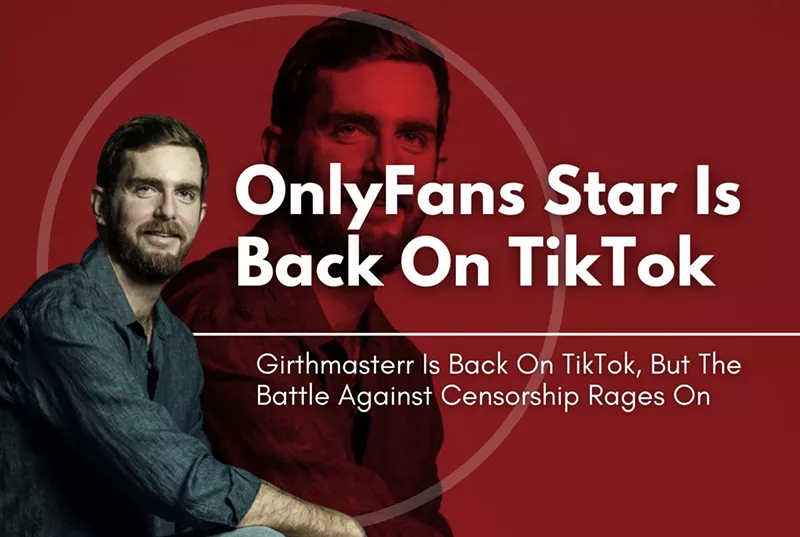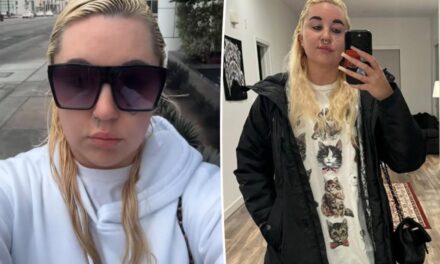“Freedom of expression” is a phrase that is becoming more and more ironic in a world dominated by digital gatekeepers that determine what content gets seen, what gets buried, and what gets digital creators bounced straight off the platform. Censorship in modern media platforms is an ever-growing problem, and content creators all over are having to find new and creative ways to make sure that their content gets in front of the people who want to see it, and— in the case of independent journalists— people who need to see it. Recently, TikTok gave an adult entertainer the boot from their platform for no obvious reason. Girthmasterr is back under a different handle, but that doesn’t alter the fact that he was removed to begin with. Girthmasterr is a successful content creator on OnlyFans, a platform that many content creators are flocking to now that it looks like TikTok is likely to be banned in the United States on January 19th. Regardless of whether or not TikTok gets the axe, the battle against censorship is only just beginning.
The tale of the adult entertainer and the video hosting platform
TikTok initially developed a reputation for being more tolerant than Meta of content that is edgier, and drives viewer traffic to another platform. Many content creators and small business owners use TikTok to promote their businesses and the content that they host on other sites— like OnlyFans. Girthmasterr was one such content creator. The popular adult entertainer used TikTok as a complimentary platform to promote his wildly popular OnlyFans page, and yet despite not violating TikTok’s Terms of Service, his TikTok account was suspended without notice. The widespread assumption is that his connection to the adult entertainment industry is what led to his suspension, despite his not sharing explicit content on the video-hosting platform. He’s back on TikTok under a new handle, but that doesn’t negate TikTok’s banning his original account for vague reasons.
TikTok’s enforcement of their terms and conditions is inconsistent at best. TikTok is a hub for content creators of all kinds, but adult entertainers have to walk a very fine line between promoting their content and catering to the algorithmic demands of their hosting platform. Girthmasterr’s rejoining under a new platform highlights how adult entertainers are resilient against censorship— they’re used to it because they have to be, and they have to learn to adapt quickly in order to continue to promote the work that they do, so they can continue to be paid to produce it. The broader implication of TikTok’s nebulous standards, however, is what is most disturbing. Where sex workers are suppressed, so to follow the voices of those in marginalized communities and industries. Where sex workers are protected and supported, so too are those in marginalized communities and industries.
OnlyFans: a hidden haven for free speech
Social media giants have been cracking down on what they’re calling “explicit” or even just controversial content under some vague and inconsistent guidelines that never seem to stay the same from month to month. Meta has even faced allegations in court that they were intentionally suppressing the content shared by adult entertainers who were using the platform— and following the agreed terms and conditions— to promote their pages on adults-only platforms like OnlyFans and Fansly. This kind of suppression has led more creators to those very adults-only platforms whose existence Meta was— allegedly— trying to suppress on their own platform. Enter OnlyFans.
On OnlyFans, content creators can share their content behind a paywall that ensures they’re paid for their work and that there’s no algorithm to cater to. OnlyFans isn’t algorithmic, and once you’ve subscribed to someone’s page, that’s the content that you’re going to see. No suppression of the material you want to see because it promotes another platform, and no content that someone is paying to promote being rammed down your throat (though if things being rammed down throats is your thing, you can absolutely find that there).
While OnlyFans is a place where many go to find explicit content that is hidden behind a paywall, that’s not the only thing you’ll find there. Athletes, artists, chefs, yogis, independent journalists, and so many other kinds of creators can be found hosting their content there. It’s a place where creators of all kinds can freely express themselves without the risk of being repressed the way they are on more mainstream platforms. OnlyFans issues a challenge to traditional and digital age censorship efforts by aggressively prioritizing user agency over automated moderation and algorithmic-driven preferences.
SCOTUS and the illusion of progress
As it stands now, TikTok is likely to be banned in the United States on January 19th, and free speech advocates across the nation are up in arms. In a society that largely exists online, pressuring that society towards platforms that are owned by just a few induviduals puts entirely too much power in the hands of those few people. The opportunity to have the accessible messaging controlled by such a small number of people— people who can suppress what doesn’t suit them— is a slippery slope. Should TikTok be the victor in the current SCOTUS case, mainstream social media platforms are privately owned. TikTok, Meta, and X (formerly Twitter) are unchecked arbiters of what is and isn’t permissible online.
Private platforms use their terms and service contracts as weapons of suppression, fully bypassing traditional free speech safeguards. Remember: TikTok recently banned Girthmasterr for no tangible reason, and Meta faced credible accusations of suppressing accounts associated with content creators in the adult entertainment industry, even though in both instances no parties were found to be in violation of the terms and services agreements they’d signed when joining each platform.
The ongoing battle against censorship
OnlyFans may have a reputation for being a hub for explicit content, but what it’s actually doing is providing a roadmap for fighting censorship through decentralization, and monetized autonomy. Each content creator on OnlyFans is responsible for getting their content in front of the audience that wants to see it, and the way they do that is by simply creating and sharing it on their page. Content creators also don’t have to create “engagement bait” to get scrollers to engage with their content in order to get paid, they’re paid directly by subscribers when they sign up for monthly subscriptions. Unlike mainstream platforms, OnlyFans takes a 20% hosting fee from creator earnings, instead of waiting to find out whether they’ve generated enough traffic on the platform to earn a payout.
Regardless of which social media platform users prefer en masse, it is ultimately most important for them to make sure that they aren’t putting all of their engagement eggs in one basket. Maintaining a presence across multiple platforms that are owned by different companies is the best way to make sure that over-reliance on any single platform is avoided, cutting down collectively on digital gatekeepers.
In order for censorship to not win the day, clearer and more fair moderation policies need to be put in place on mainstream social media platforms. Free speech is only free as long as its protected, and protecting free speech requires constant vigilance— regardless of whether the courts rule in favor of a favorite tech giant or not.
Censorship isn’t just an issue for courts and legal teams, it’s a cultural and technological battleground, and social media users are the foot soldiers. In the fight for free expression, creators like Girthmasterr and platforms like OnlyFans prove that while you might have to get a little creative, there is always a way to push back.
This post was originally published on this site be sure to check out more of their content.







